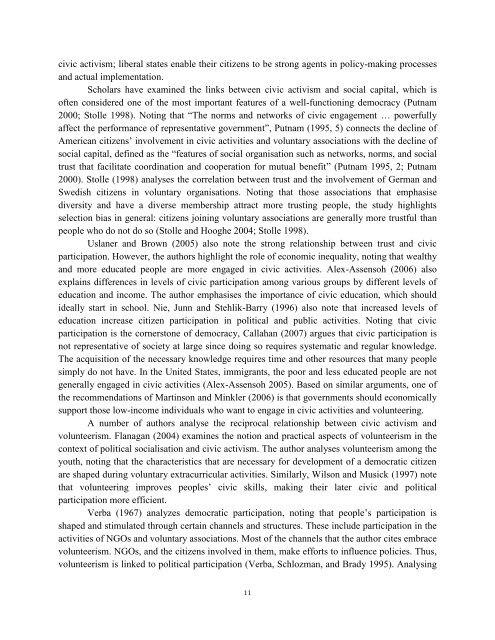Civic Activism as a Novel Component of Armenian Civil Society
English-3
English-3
You also want an ePaper? Increase the reach of your titles
YUMPU automatically turns print PDFs into web optimized ePapers that Google loves.
civic activism; liberal states enable their citizens to be strong agents in policy-making processes<br />
and actual implementation.<br />
Scholars have examined the links between civic activism and social capital, which is<br />
<strong>of</strong>ten considered one <strong>of</strong> the most important features <strong>of</strong> a well-functioning democracy (Putnam<br />
2000; Stolle 1998). Noting that “The norms and networks <strong>of</strong> civic engagement … powerfully<br />
affect the performance <strong>of</strong> representative government”, Putnam (1995, 5) connects the decline <strong>of</strong><br />
American citizens’ involvement in civic activities and voluntary <strong>as</strong>sociations with the decline <strong>of</strong><br />
social capital, defined <strong>as</strong> the “features <strong>of</strong> social organisation such <strong>as</strong> networks, norms, and social<br />
trust that facilitate coordination and cooperation for mutual benefit” (Putnam 1995, 2; Putnam<br />
2000). Stolle (1998) analyses the correlation between trust and the involvement <strong>of</strong> German and<br />
Swedish citizens in voluntary organisations. Noting that those <strong>as</strong>sociations that emph<strong>as</strong>ise<br />
diversity and have a diverse membership attract more trusting people, the study highlights<br />
selection bi<strong>as</strong> in general: citizens joining voluntary <strong>as</strong>sociations are generally more trustful than<br />
people who do not do so (Stolle and Hooghe 2004; Stolle 1998).<br />
Uslaner and Brown (2005) also note the strong relationship between trust and civic<br />
participation. However, the authors highlight the role <strong>of</strong> economic inequality, noting that wealthy<br />
and more educated people are more engaged in civic activities. Alex-Assensoh (2006) also<br />
explains differences in levels <strong>of</strong> civic participation among various groups by different levels <strong>of</strong><br />
education and income. The author emph<strong>as</strong>ises the importance <strong>of</strong> civic education, which should<br />
ideally start in school. Nie, Junn and Stehlik-Barry (1996) also note that incre<strong>as</strong>ed levels <strong>of</strong><br />
education incre<strong>as</strong>e citizen participation in political and public activities. Noting that civic<br />
participation is the cornerstone <strong>of</strong> democracy, Callahan (2007) argues that civic participation is<br />
not representative <strong>of</strong> society at large since doing so requires systematic and regular knowledge.<br />
The acquisition <strong>of</strong> the necessary knowledge requires time and other resources that many people<br />
simply do not have. In the United States, immigrants, the poor and less educated people are not<br />
generally engaged in civic activities (Alex-Assensoh 2005). B<strong>as</strong>ed on similar arguments, one <strong>of</strong><br />
the recommendations <strong>of</strong> Martinson and Minkler (2006) is that governments should economically<br />
support those low-income individuals who want to engage in civic activities and volunteering.<br />
A number <strong>of</strong> authors analyse the reciprocal relationship between civic activism and<br />
volunteerism. Flanagan (2004) examines the notion and practical <strong>as</strong>pects <strong>of</strong> volunteerism in the<br />
context <strong>of</strong> political socialisation and civic activism. The author analyses volunteerism among the<br />
youth, noting that the characteristics that are necessary for development <strong>of</strong> a democratic citizen<br />
are shaped during voluntary extracurricular activities. Similarly, Wilson and Musick (1997) note<br />
that volunteering improves peoples’ civic skills, making their later civic and political<br />
participation more efficient.<br />
Verba (1967) analyzes democratic participation, noting that people’s participation is<br />
shaped and stimulated through certain channels and structures. These include participation in the<br />
activities <strong>of</strong> NGOs and voluntary <strong>as</strong>sociations. Most <strong>of</strong> the channels that the author cites embrace<br />
volunteerism. NGOs, and the citizens involved in them, make efforts to influence policies. Thus,<br />
volunteerism is linked to political participation (Verba, Schlozman, and Brady 1995). Analysing<br />
11



